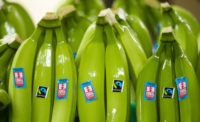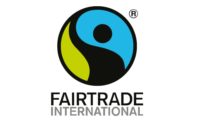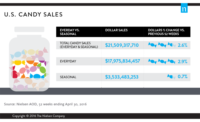Fairtrade America says results from its biennial Fairtrade Consumer Insights report point to increased trust and favorable perception of Fairtrade certified brands and products among consumers, as well as increased recognition of the Fairtrade Mark.
Conducted with more than 2,000 U.S. consumers and more than 15,000 consumers globally via an online survey by GlobeScan, the new research included several findings specific to American consumers:
- Fairtrade awareness among U.S. consumers has grown by almost 50 percent since 2019; current awareness is at 41 percent in the U.S.
- The Fairtrade Mark has a positive impact on brand perception among U.S. consumers — 80 percent of U.S. shoppers aware of Fairtrade would look at a brand that carried its certification label more favorably (versus 76 percent in 2019).
- Trust in Fairtrade among U.S. consumers has increased, with 57 percent of U.S. consumers trusting the Fairtrade International Mark (versus 48 percent in 2019).
- Coffee remains the most recognized Fairtrade product, and U.S. shoppers are willing to pay up to 35 percent per pound more for Fairtrade coffee.
- Chocolate is also one of the most recognized Fairtrade products, with U.S. shoppers willing to pay up to 30 percent per bar more for Fairtrade chocolate.
The COVID-19 pandemic served as a wake-up call to consumers about the need to make more ethical purchasing choices. According to independent GlobeScan public opinion research, consumers now expect companies to demonstrate fair wages, fair employee treatment, and environmental protection in sourcing and production.
Since the pandemic, GlobeScan has seen increases in the public’s expectations of companies to act responsibly. In fact, 41 percent of U.S. respondents say they have changed their purchasing choices within the past year to make a difference on an economic, social, environmental, social, or political issue, indicating people increasingly see their everyday shopping as an important way to make a difference.
The Fairtrade Insights report found that nearly three-quarters of consumers who have seen the Fairtrade label when shopping feel it is more important than ever to support Fairtrade in building a better economy for all. Shoppers looking for ethical products are most concerned about child labor, deforestation and sustainable farming practices, and working conditions, all key impact areas for Fairtrade internationally.
“The pandemic opened the public’s eyes to how interconnected we are to our communities as well as to the global supply chains we all rely on to produce everyday staples,” said Peg Willingham, executive director, Fairtrade America. “Shoppers worldwide, including here in the U.S., are realizing the positive impact their purchasing decisions can have on farmers and workers to receive fair prices, assistance to adapt their practices to the changing climate and empower women and children in farming communities worldwide. We are pleased to see this growing traction for the Fairtrade Mark and the positive perception it imparts on our brand partners. Our goal is to grow U.S. consumer preference of Fairtrade to the levels of certified organic goods.”
In recent years, some major U.S. brands have shifted away from credible third-party certifications in favor of internal self-regulation around issues including child labor, fair prices for farmers and sustainability. However, consumers are skeptical. Independent GlobeScan 2020 data shows that less than half of respondents trust companies’ communications about their own social and environmental performance.
“GlobeScan has recently seen significant increases in people wanting to make more socially and environmentally responsible shopping choices,” said Caroline Holme, senior director, GlobeScan. “But we know that behavior lags attitudes, so ethical labels like Fairtrade can be valuable, trusted guides for busy shoppers.”
To help people easily identify and purchase Fairtrade-certified products, Fairtrade America recently launched a new product finder including hundreds of certified goods sold in the U.S. with more products being added on a regular basis. In the U.S., 5,000 products are registered with the Fairtrade Mark.




